
 |
| HOME | OUR COLLECTIONS | ABOUT US | CONTACT US | |||
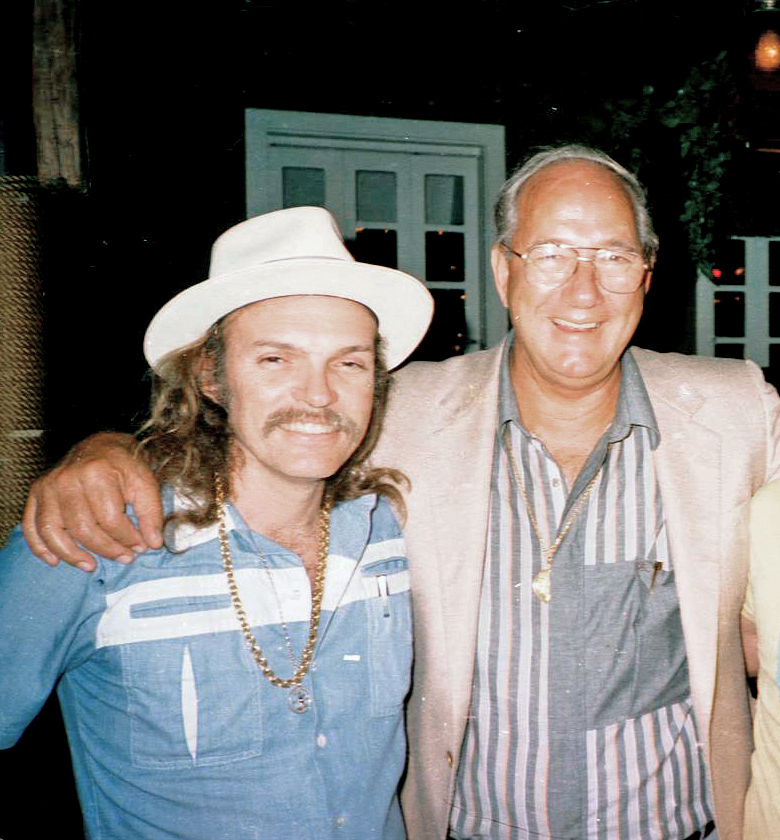 Bernard & Mel Fisher c1992 Two Friends Bar, Key West |
TREASURE Recovered from Mel Fisher's 
and other
Famous Shipwrecks; Consolación (1681), Princess Louisa (1743), Rooswijk (1739) | 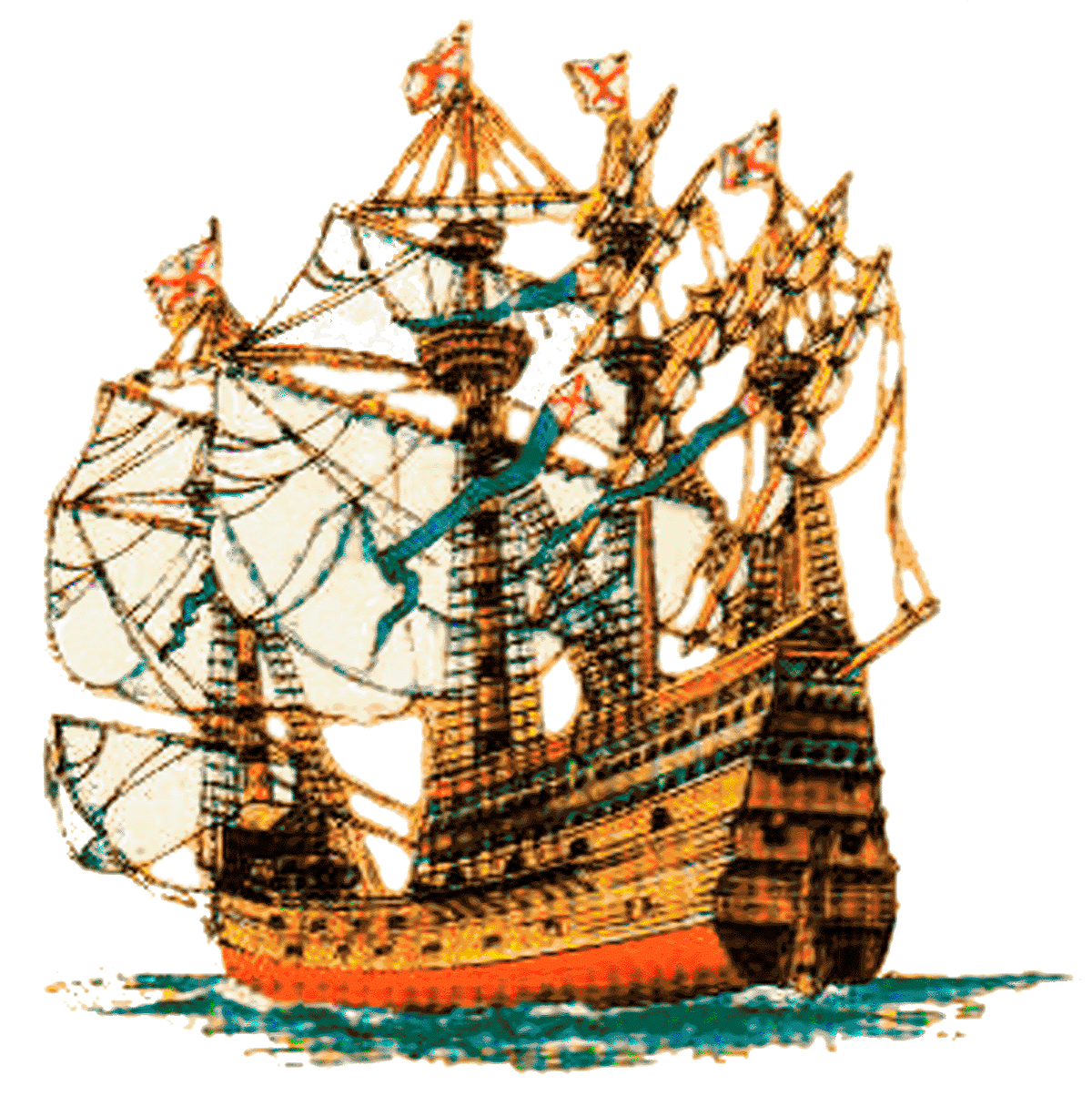 |
|
|
|
Experience acquired while working in the Marine Salvage business has given Bernard Reller the knowledge and contacts necessary to understand the value and appeal of treasure coins and artifacts. His many associations in the marine salvage business have allowed the recent acquisition of a significant number of coins carried aboard the Spanish galleon Atocha. All coins are in the Grade I and Grade II range. The coins are available for discerning collectors. |
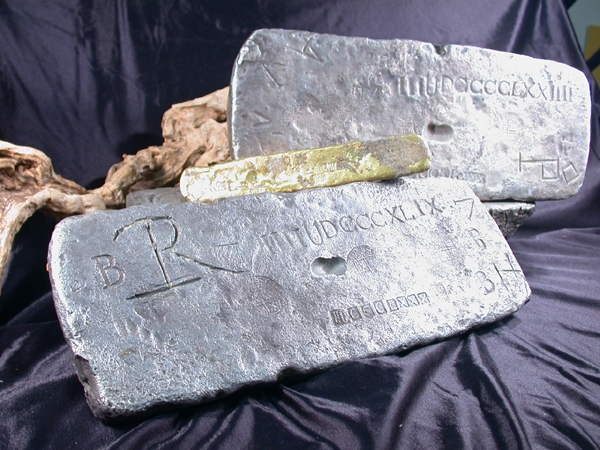 Atocha Silver and Gold Bars |
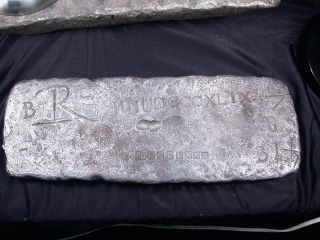 The "Lyon" Silver Bar |
|||
|
The
coins displayed below are authentic
treasure coins. Both sides of the framed coins are shown along with
known information about each; the wreck from which they came,
their denomination, monarch at time of minting, where they
were minted, the intial of the assayer (when visible) and the date of
creation (when visible). Certificates
of Authenticity are provided for each Treasure Coin. ~
All Coin
Mountings are 14K Gold ~
|
||
Nuestra
Señora de Atocha, 1622
In
September of 1622, during a hurricane, the Nuestra Señora de Atocha
went down forty miles west of Key West. Some of the wreckage was
discovered in 1971, by Mel Fisher after years of searching. It's main
treasure-trove was finally located in 1986 producing large quantities
of silver cobs, gold bars, jewelry, and choice emeralds. |
||
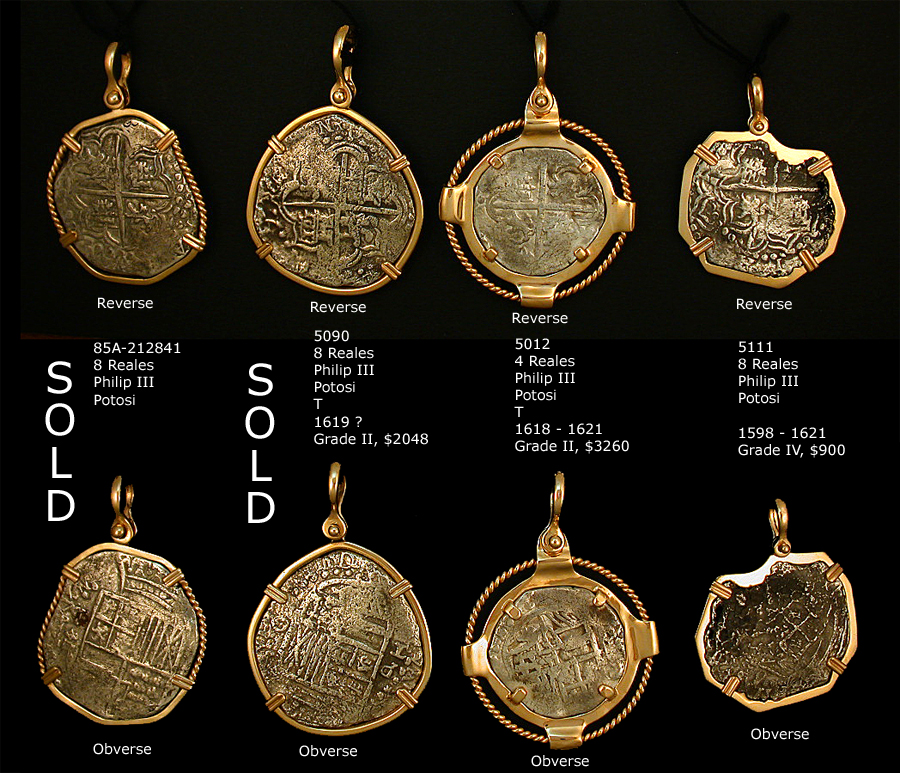 Atocha 1622, Original Treasure Salvor's Certificate of Authenticity provided. 800-233-4820 8:00 AM to 4:30 PM, Eastern |
Santa
Maria de la Consolación, 1681
Delayed in leaving, the Santa Maria de la Consolación sailed alone in 1681, heavily ladened with silver coins from Chile. Pursued by the infamous buccaneer, Bartholomew Sharp, the Consolación ran aground on a reef near Santa Clara island, known as Isla de Muerto (Island of the Dead or Deadman's Island), in the Bay of Guayaquila, Equador. The ship was set afire by the crew and neither the pirates nor returning Spaniards were able to salvage the treasure. The treasure was finally discovered in 1998. All Mountings are 14K Gold. | ||
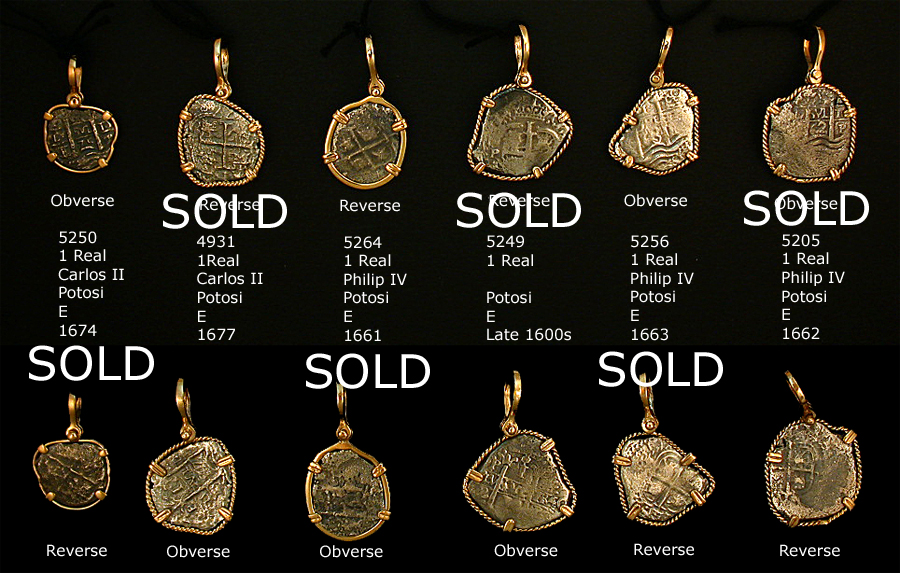 800-233-4820 8:00 AM to 4:30 PM, Eastern |
||
| Santa
Maria de la Consolación, 1681 All Mountings are 14K Gold 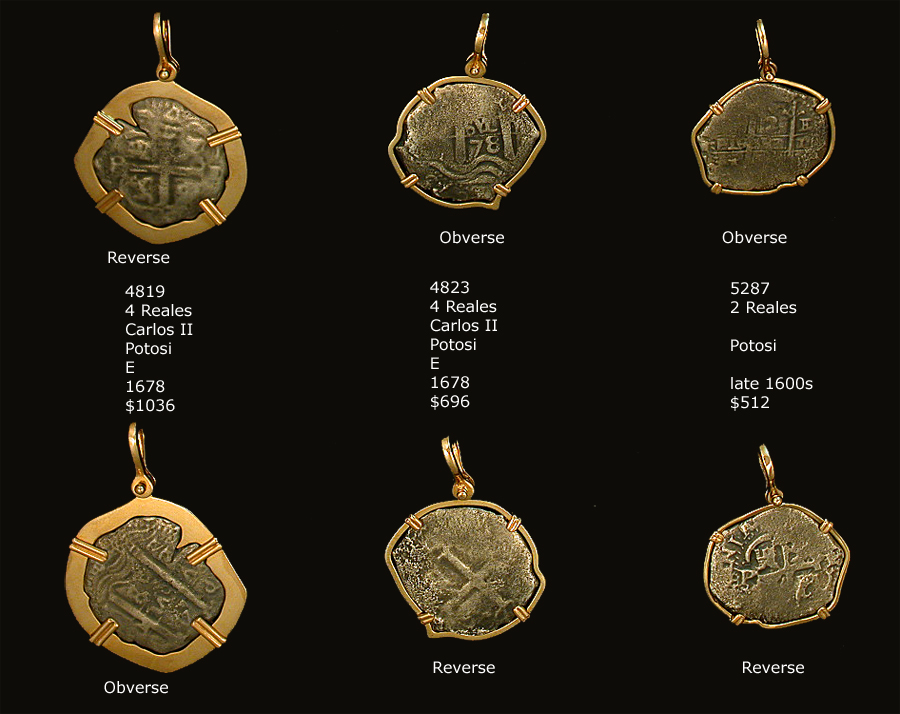 800-233-4820 8:00 AM to 4:30 PM, Eastern | ||
| Santa
Maria de la Consolación, 1681 All Mountings are 14K Gold. 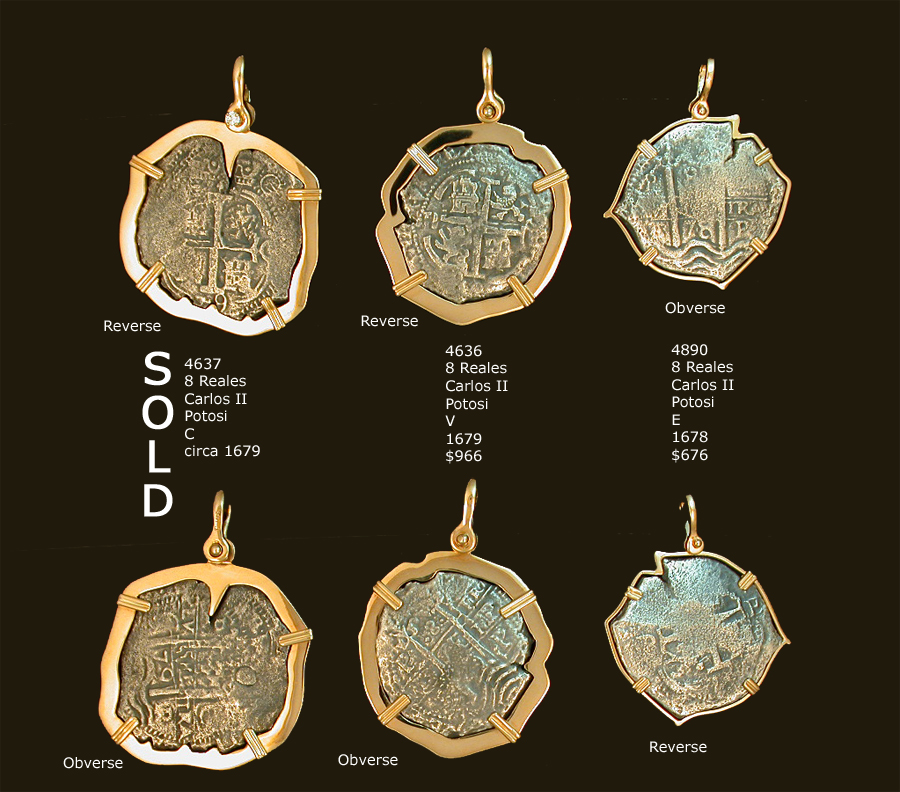 800-233-4820 8:00 AM to 4:30 PM, Eastern | ||
| Santa
Maria de la Consolación, 1681 All Mountings are 14K Gold. 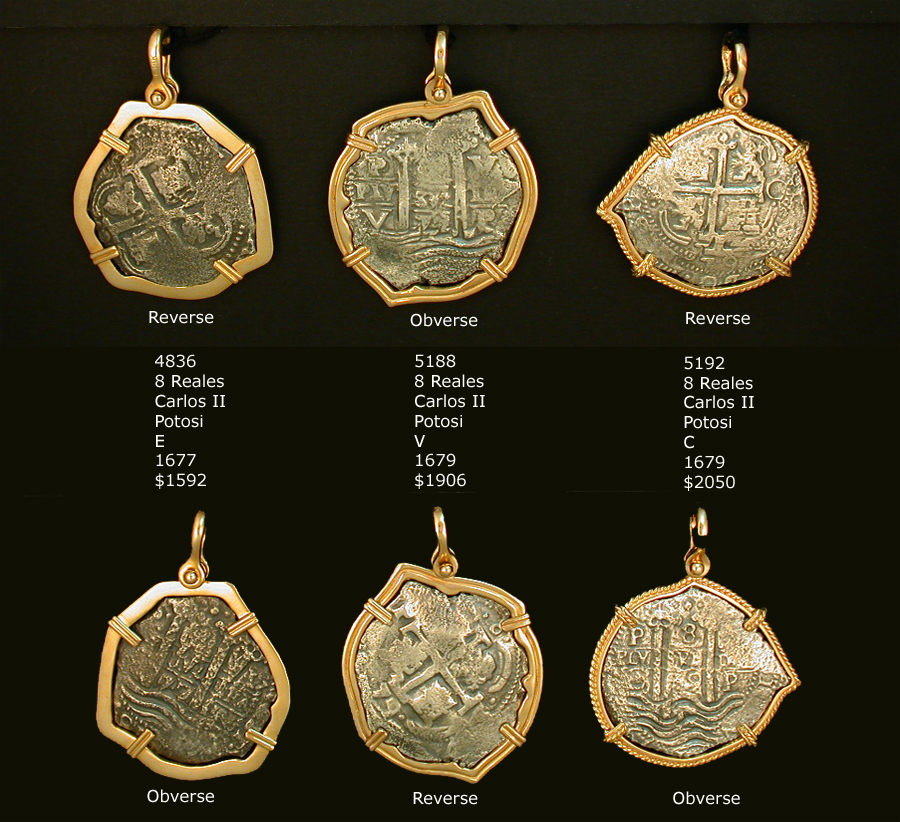 800-233-4820 8:00 AM to 4:30 PM, Eastern |
||
| Santa
Maria de la Consolación, 1681 All Mountings are 14K Gold. 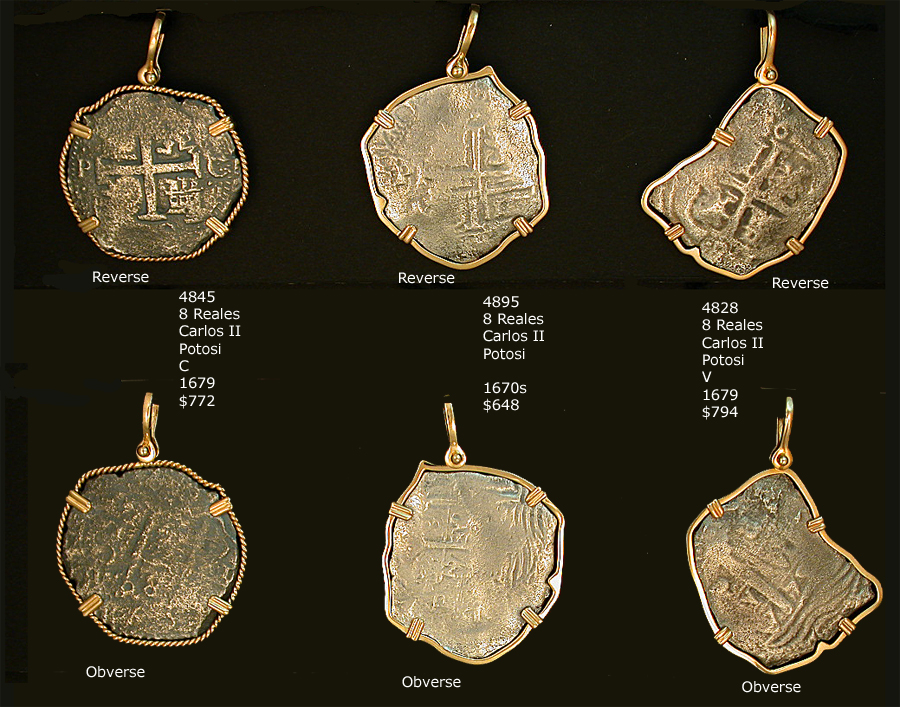 800-233-4820 8:00 AM to 4:30 PM, Eastern |
Princess
Louisa, 1743
The Princess Louisa,
an East Indiamen ship, was lost in 1743 on
Galleons Reef in the treacherous waters off the Cape Verde Islands. She
carried Spanish Colonial cob coinage from the New World mints of
Potosí, Lima and Mexico. An effort to salvage the shipwreck in 1744 was
unsuccessful as were numerous later attempts. In a 1998 – 1999
expedition, a well-known marine archeological recovery company,
Arqueonautas, located and recovered the historical treasure coins of
the Princess Louisa.
All Mountings are 14K Gold. | ||
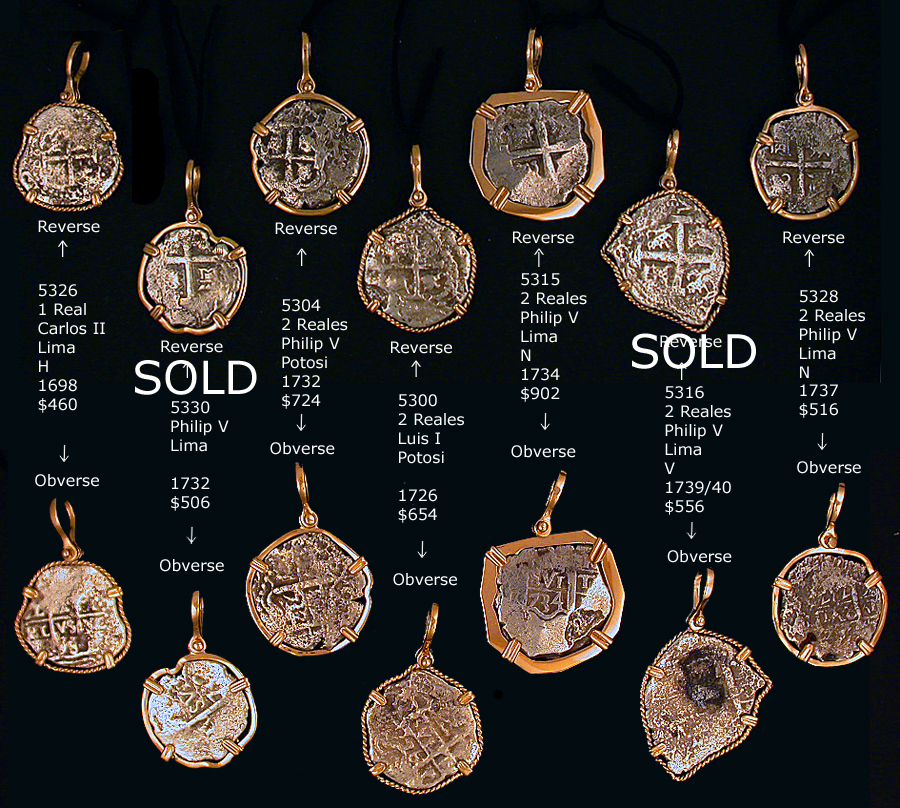
800-233-4820 8:00 AM to 4:30 PM, Eastern |
||
Rooswijk,
1739
The
Dutch East Indiaman Rooswijk
was lost on December 19th, 1739, after striking the
treacherous Goodwin Sands off the South East coast of England in a
heavy storm. The ship had left the Dutch port of
Texel carrying a large quantity of Spanish silver intended for
trade and payroll in the Dutch East Indies. She sank with the
loss of all hands. The shipwreck and her treasure was
discovered in 2004. All Mountings are 14K Gold. |
||
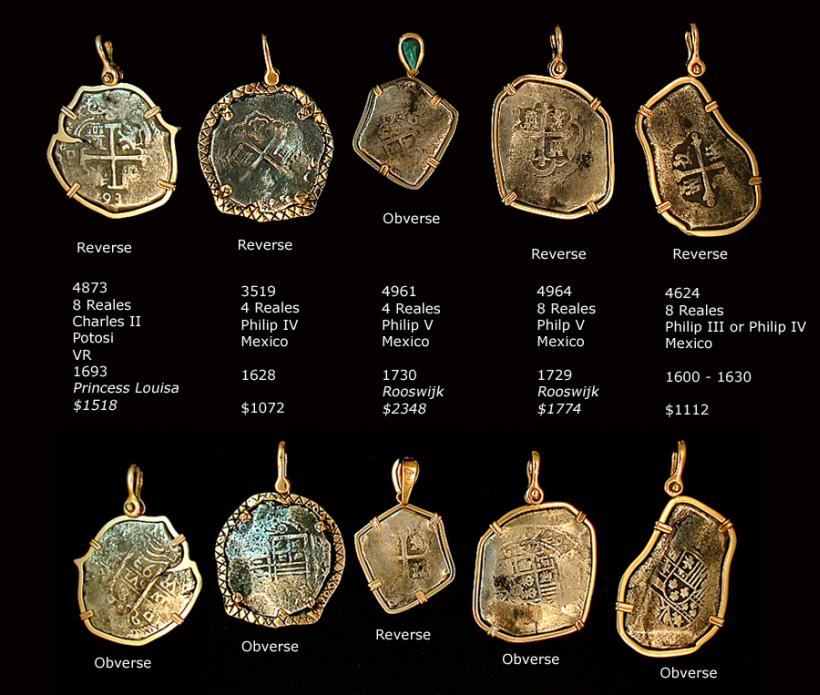 800-233-4820 8:00 AM to 4:30 PM, Eastern |
| Treasure
Books Call for current pricing. 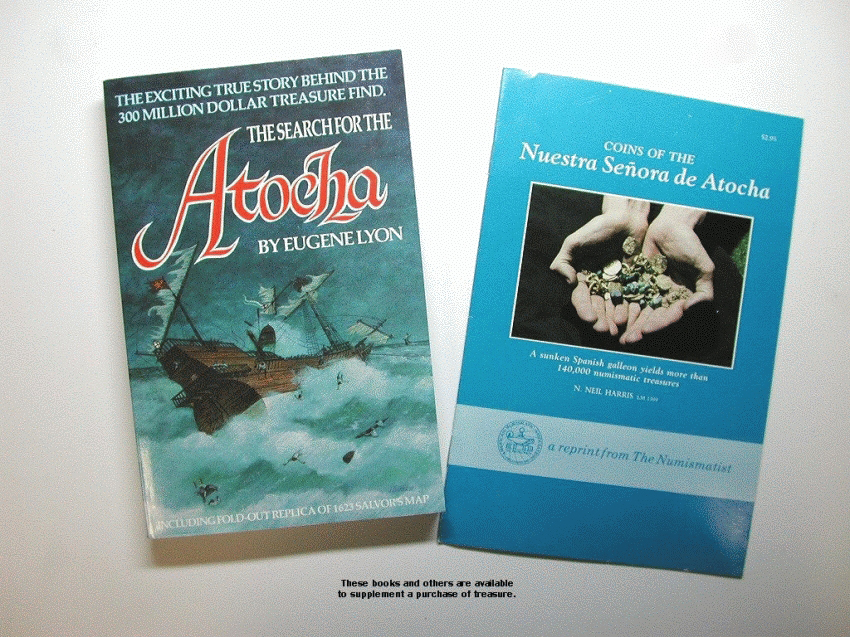 Go Back or Return to Top
|
| Famous Shipwrecks |
|
Admiral Gardner |
Atocha | |||
|
Capitana (El Rubi) Flagship
of the Fleet of 1733, El
Rubi
carried more than a ton of gold
and
silver coins and bullion along with ingots of copper and other New
World commodities. After running aground in a hurricane she eventually
settled to the bottom. The Spaniards recovered several boxes of mostly
copper coins. The remainder was located in 1938, the first such
discovery of the Fleet of 1733.
| Concepcion Lost
near
Hispaniola on November 1, 1641, the
Concepción went
down with more than 60,000 cobs from the reigns of Philip II, Philip
III, and Philip IV.
|
|||
Consolación Delayed in leaving,
the Santa Maria De La
Consolación
sailed alone in 1681, heavily
ladened with silver coins from Chile. Pursued by the infamous
buccaneer, Bartholomew Sharp, the Consolación ran
aground on a reef near Santa Clara island, known as Isla de
Muerto
(Island of the Dead or Deadman's Island), in the Bay of Guayaquila,
Equador.
The ship was set afire by the crew and neither the pirates nor
returning Spaniards were able to salvage the treasure.
| El
Constante While
returning from Vera Cruz to Spain, El
Constante
sank
off the Louisiana coast in September of 1766. The wreckage was salvaged
under the control of State of Louisiana archeologists.
| |||
|
Fleet
of 1554 In 1554,
three Spanish galleons of a fleet of twenty went down off
Padre Island, Texas. Coins recovered from the wreckage date to the
reign of Carlos and Johanna.
|
Fleet
of 1715 In July of 1715, ten Spanish galleons sank off the east coast of Florida. Thousands of reale cobs from the reign of Philip V were recovered in the late 1950s. | |||
|
Fleet
of 1733
The
Florida
Keys claimed a fleet of twenty galleons in July of 1733.
Much of the treasure was recovered by the Spanish, but divers have
found silver cobs and rare pillar dollars.
|
Joanna
A British
East India ship, the Joanna,
sank off the southern tip of
Africa in June of 1682. Silver cobs from the reigns of Charles II and
Philip IV have been recovered.
|
|||
La Capitana
The Spanish Flagship La Capitana Jesus Maria
sank off the coast of Equador in the mid-17th Century carrying
Peruvian gold, silver and jewels. The treasure's value has
been
estimated between $3.7 Billion and $7.5 Billion.
| Lucayan Beach Wreck A Dutch
ship or a captured Spanish galleon was found off Lucayan Beach,
Grand Bahamas. More than fifteen thousand silver coins from Mexico City
and Potosi have been recovered.
|
|||
Maravilla
The Maravilla sank in
January 1656, off Little Bahama Bank. Recovered
from the wreck were silver cobs of the Mexico City and Potosi Mints and
gold two escudo cobs of Santa Fe de Bogotá (Colombia) Mint.
|
Princess Louisa The
Princess Louisa,
an East Indiamen ship, was lost in 1743 on Galleons
Reef in the treacherous waters off the Cape Verde Islands. She carried
Spanish Colonial cob coinage from the New World mints of Potosí, Lima
and Mexico.
An effort to salvage the shipwreck in 1744 was unsuccessful as were numerous later attempts. In a 1998 – 1999 expedition, a well-known marine archeological recovery company, Arqueonautas, located and recovered the historical treasure coins of The Princess Louisa. |
|||
The Dutch East Indiaman Rooswijk,
under the command of Captain Daniel Ronzieres, was lost on December
19th, 1739 off the South East coast of England after striking the
Goodwin Sands in a heavy storm. The ship
carried a
large quantity of Spanish silver intended for trade and payroll in the
Dutch East Indies destined for the Spice Islands of Indonesia. In 2004,
more than 250 years after she sank with all hands aboard the wreck was
discovered by a amateur diver. A large amout of treasure was
recovered from the wreckage, including Spanish pillar dollars,
cob
coins, and silver bars. Most of the treausre was returned to
the
Netherlands government. | Santa Margarita The Santa
Margarita, sister ship to the Atocha, went down
on September
6, 1622, off the coast of the Florida Keys. Thousands of coins and a
quantity of gold bars and chains have been recovered. | |||
|
Whydah Driven
ashore off Eastham on Cape Cob during a storm, the pirate ship Whydah, yielded
more than five thousand silver cobs from the Mexico and
Potosi
Mints.
|
| |||
|
|
The information
contained in this site is copyright protected. It may not be
used
without prior written consent from Reller, Inc., or its partner
companies. The designs in this site are also trademark
protected.
Under trademark law designs that come close to, or are deliberate
imitations of or bear similarity of the use infringes on trademark law
and may be prosecuted in court.
|